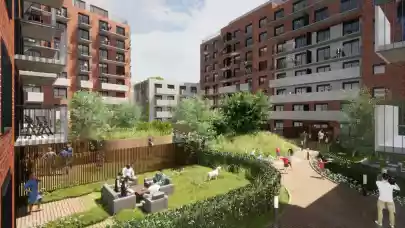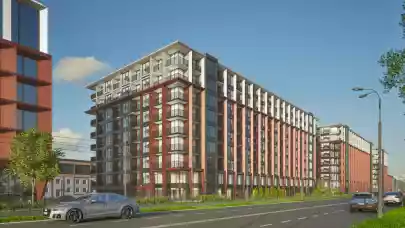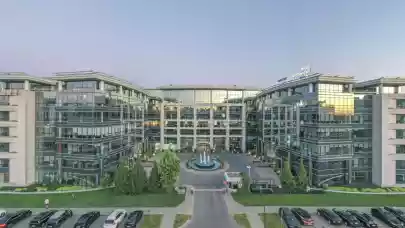
Hungary-based Alfa Group plans to raise approximately HUF 10 billion in its first Green Bond issue scheduled for October 2021. Ohad Epschtein, Managing Partner of Alfa Group International talked to Property Forum about the importance of sustainability and he also shared some details about the company’s expansion strategy.
Alfa Group has recently announced plans to issue its first Green Bond. How have you arrived at this milestone? What sort of role does sustainability play in the company’s overall strategy?
Alfa Group was established in Hungary in 1999 and ever since I joined the company in 2007, we were always looking at the bigger picture and the impact our company has on the environment and on society.
Since 2011, we have been working on an environmentally sustainable portfolio of office, retail and urban logistics assets. After almost 9 years, in 2020 we completed the transition of the portfolio to one that includes buildings with best-in-class energy performance. We’ve also focused on helping our clients understand our efforts and encourage them to work with us. We regularly inform our stakeholders on how they contribute to saving energy, via our initiative of Green-Heart-Campaign, because one of the most efficient green strategies is to consume less.
Since 2016, we have decided to invest in further diversifying our assets towards the urban logistics and residential sectors. We are completing most of the developments in a ‘for sale’ profile and aim to enlarge our urban logistics portfolio with an additional 8,000 sqm in 2021, while from 2022 we plan to expand into the residential-for-rent sector (PRS) with premises of 23,000 sqm (up to 480 apartments), all of which are approved developments adapted to highest energy performance standard.
The company management is committed to a sustainable future and we intend to issue the bond to partly fund the development activities, as mentioned above, in line with green bonds ICMA standard.
Our methodology is to belong to the top 15% most energy-efficient buildings on the market, in each category: retail, logistics, office and residential.

Ohad Epschtein
Managing Partner
Alfa Group International
How do you see investors responding to your green bonds?
There is increased demand for green bonds from investors overall and the green bond market has become a mature one over the past years. In the first 6 months of 2021, the total volume of green bonds that have been issued in Hungary and Europe was higher than in the last 4 years combined. Investors’ acceptance of the product is definitely available and we are prepared for auctioning our first Green Bonds in October 2021.
How do you see the attractiveness of bond financing compared to bank financing at the moment?
Bonds issued by the holding entity Alfa Equity Holding allow us to increase the pace of the company’s development plans, allocating the Group’s financial resources to becoming a more sizeable company in the submarkets we are in. We intend to reinvest all generated profits into further development without needing to repay bank loans each time on a project basis. From a structural perspective, bonds allow us to reallocate the company’s resources in line with the standard way the development business is run.
We have a long track record with mortgage-based financing and we don’t look at capital markets as a substitute or a replacement for mortgage-based financing loans. We believe that both funding sources are compatible and will help continue the company's growth.
Have you observed any changes in financing conditions since the start of the pandemic?
In our portfolio and with the banks we work together, we managed to maintain good collection rates. A lot of communication and meetings transformed to being conference calls, and this helped us to cooperate with all our stakeholders returning to the standard course of business sooner than we thought. Thanks to clearly set-up company processes and workflows we managed to switch more rapidly to digital communication. We are proud to say that even though the pandemic and within the last 18 months we concluded four new loan facility agreements and managed to start new business relationships with two international financial institutions.
Alfa Group has a well-diversified portfolio. Have your asset class preferences changed based on how they performed during the pandemic?
Every day we are learning about new aspects of how the pandemic impacts our day-to-day life. What I have observed is that some market changes that started prior to the pandemic accelerated at a stronger pace through the pandemic. Our company has made a strategic decision to allocate resources to the residential and urban logistic segments from 2017 already. We trust this decision serves us even better now.
What development projects are you currently working on?
We are currently constructing two residential projects, namely 2913 Living and HA11ER and two urban logistics premises at Alfa Hub 11 in Budapest. Alfa Hub 11 is an urban logistics project located in the 11th district of Budapest. The planned completion is end-2021 and the NLA after construction is 27,185 sqm.
The 2913 Uptown Homes residential project is located in the 13th district of Budapest. The planned completion date of the 29 apartments with 29 parking spaces is end-2021. The NSA is 1,834 sqm.
The HA11ER residential project is located in the 9th district of Budapest. There are 3 phases of this project. The planned completion of phase one is in 2022, followed by phase 2 in 2023 and phase 3 in 2025. The total number of apartments in 3 phases is 740 with 581 parking spaces. The NSA for all three phases together is 55,473 sqm.
Green Bond proceeds will be used partly in these projects.
You’re planning to expand to the residential-for-rent market which is not a well-established segment in Hungary yet. What are your experiences so far?
There are many flats for rent available on the secondary market in Hungary and in Budapest, especially. As you said correctly, the primary market is mainly residential for homeowners. Having said that, anticipating trends is a key to ongoing success and I do believe that due to the dramatic increase in the cost of flats, we are already in a phase of adaptation where people, especially young professionals, are starting to understand that in some cases it makes more financial sense to rent an apartment than to buy one.
Being active in both PRS and residential-for-sale, we see the supply-side of newly built apartments for rent as less crowded compared to the latter. We are and will remain active in both submarkets.
We understand that in Budapest, and especially in the inner-city locations, the yields for building flats for rent are lower than the potential earnings from selling apartments. Strategically, we want to be present in both segments. We trust our strategic decision-making which has allowed us to work on an environmentally sustainable portfolio of real estate assets for almost 10 years now and it will allow us to issue our first green bond to partly fund our development activities.



